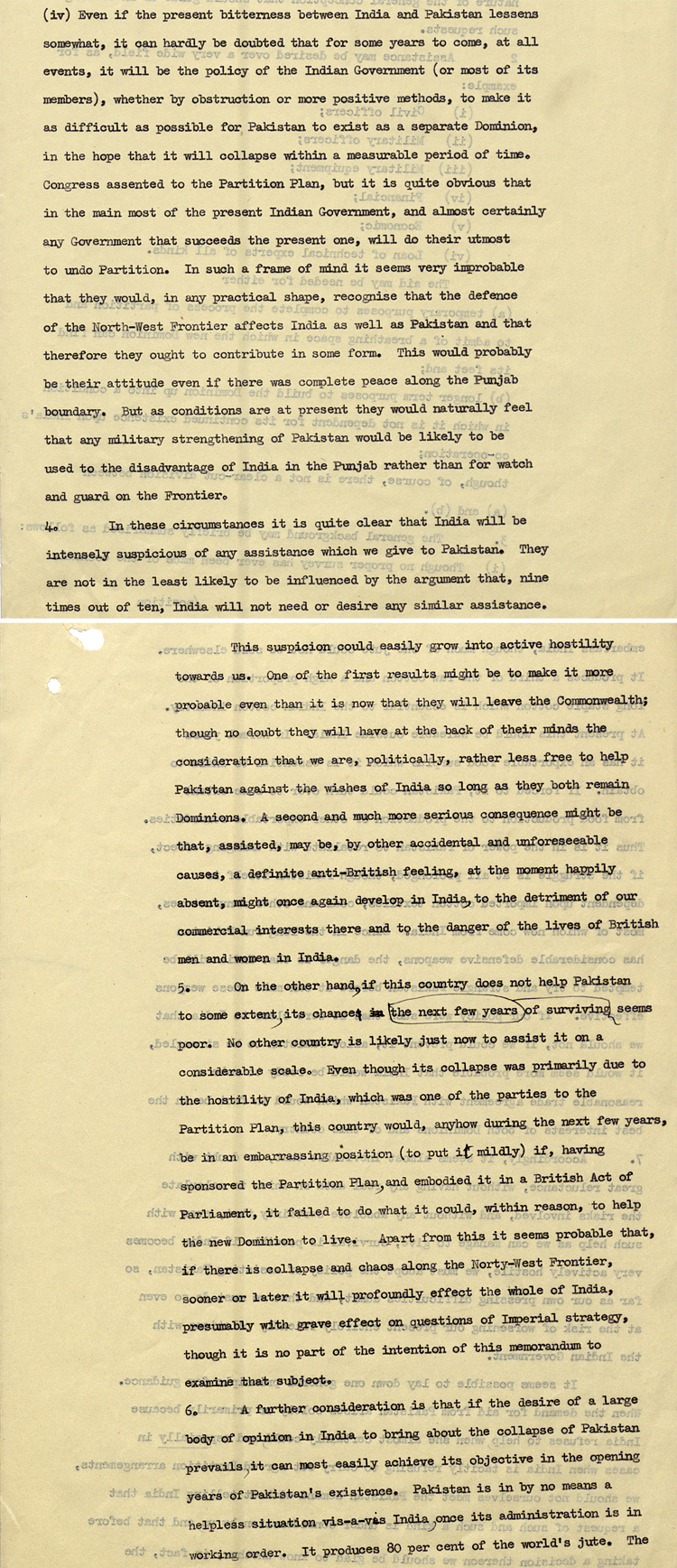
Analysis from British government on likely future relations between India and Pakistan, 20th October 1947 (DO 121/69)
Transcript
(iv) Even if the present bitterness “between India and Pakistan lessens somewhat, it can hardly be doubted that for some years to come, at all events, it will be the policy of the Indian Government (or most of its members), whether by obstruction or core positive methods, to make it as difficult as possible for Pakistan to exist as a separate Dominion, in the hope that it will collapse within a measurable period of time. Congress assented to the Partition Plan, but it is quite obvious that in the main most of the present Indian Government, and almost certainly any Government that succeeds the present one, will do their utmost to undo Partition. In such a frame of mind it seems very improbable that they would, in any practical shape, recognise that the defence of the North-West Frontier affects India as well as Pakistan and that therefore they ought to contribute in some form. This would probably be their attitude even if there was complete peace along the Punjab boundary. But as conditions are at present they would naturally feel that any military strengthening of Pakistan would be likely to be used to the disadvantage of India in the Punjab rather than for watch and guard on the Frontier.
4. In these circumstances it is quite clear that India will be intensely suspicious of any assistance which we give to Pakistan. They are not in the least likely to be influenced by the argument that, nine times out of ten, India will not need or desire any similar assistance.
This suspicion could easily grow into active hostility towards us. One of the first results might be to make it more probable even than it is now that they will leave the Commonwealth though no doubt they mil have at the back of their minds the consideration that we are, politically, rather less free to help Pakistan against the wishes of India so long as they both remain Dominions. A second and more serious consequence might be that, assisted, may be, by other accidental and unforeseeable causes, a definite anti-British feeling, at the moment happily absent, might once again develop in India, to the detriment of our commercial interests there and to the danger of the lives of British men and women in India.
5. On the other hand, if this country does not help Pakistan to some extent, its chance in the next few years of surviving seems poor. No other country is likely just now to assist it on a considerable scale. Even though its collapse was primarily due to the hostility of India, which was one of the parties to the Partition Plan, this country would, anyhow during the next few years, be in an embarrassing position (to put it mildly) if, having sponsored the Partition Plan and embodied it in a British Act of Parliament, it failed to do what it could, within reason, to help the new Dominion to live. Apart from this it seems probable that, if there is collapse and chaos along the North-West Frontier, sooner or later it will profoundly effect the whole of India, presumably with grave effect on questions of Imperial strategy, though it is no part of the intention of this memorandum to examine that subject.
6. A further consideration is that if the desire of a large body of opinion in India to bring about the collapse of Pakistan prevails, it can most easily achieve its objective in the opening years of Pakistan’s existence. Pakistan is in by no means a helpless situation vis-a-vis India, once its administration is in working order. It produces 80 per cent of the world’s jute.
